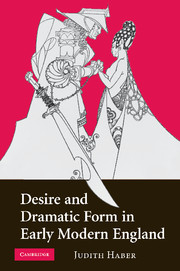Book contents
- Frontmatter
- Contents
- Acknowledgments
- Textual note
- Introduction: consummate play
- Part I “COME … AND PLAY”: CHRISTOPHER MARLOWE, BESIDE THE POINT
- Part II DESIRING WOMEN IN THE SEVENTEENTH CENTURY
- 5 “How strangely does himself work to undo him”: (male) sexuality in The Revenger's Tragedy
- 6 “My body bestow upon my women”: the space of the feminine in The Duchess of Malfi
- 7 “I(t) could not choose but follow”: erotic logic in The Changeling
- 8 “Old men's tales”: legacies of the father in ’Tis Pity She's a Whore
- 9 The passionate shepherdess: the case of Margaret Cavendish
- Afterword: for(e)play
- Notes
- List of Works cited
- Index
8 - “Old men's tales”: legacies of the father in ’Tis Pity She's a Whore
Published online by Cambridge University Press: 02 July 2009
- Frontmatter
- Contents
- Acknowledgments
- Textual note
- Introduction: consummate play
- Part I “COME … AND PLAY”: CHRISTOPHER MARLOWE, BESIDE THE POINT
- Part II DESIRING WOMEN IN THE SEVENTEENTH CENTURY
- 5 “How strangely does himself work to undo him”: (male) sexuality in The Revenger's Tragedy
- 6 “My body bestow upon my women”: the space of the feminine in The Duchess of Malfi
- 7 “I(t) could not choose but follow”: erotic logic in The Changeling
- 8 “Old men's tales”: legacies of the father in ’Tis Pity She's a Whore
- 9 The passionate shepherdess: the case of Margaret Cavendish
- Afterword: for(e)play
- Notes
- List of Works cited
- Index
Summary
John Ford's ’Tis Pity She's a Whore, written after tragedy had ceased to occupy the central position on the Renaissance stage, has often been considered in relation to its predecessors. Readings of this relationship, however, have varied widely. On the one hand, Ford's play has been viewed as “the last, belated Jacobean tragedy,” the final gasp of serious tragic form in a world of fantastic, “feminine” tragicomedy. On the other hand, it has been seen as a falling off from earlier accomplishments, considered as “decadent” and thus effectively feminized itself. And, on the third hand (because these things are never simple), it has been credited with self-consciously criticizing and playing with the forms that it has inherited. I would suggest that all these conceptualizations contain some truth. Even more fully than its Jacobean precursors, ’Tis Pity inhabits a masculinized tragic space that it simultaneously criticizes from within, unsettling the categories of masculinity and tragedy, unmasking them (and itself) as inescapably transgressive and fundamentally fantasmatic. Both on the level of its fiction and on the level of its form, it forcefully enacts patriarchal imperatives while exposing their contradictions – precisely by pushing them so forcefully to their logical (and absurd) conclusions.
I would like to begin demonstrating this by briefly reconsidering Ford's relation to two of his best-known predecessors.
- Type
- Chapter
- Information
- Desire and Dramatic Form in Early Modern England , pp. 103 - 116Publisher: Cambridge University PressPrint publication year: 2009



